Biography
On the 19th of June 1912, in Roman, Neamţ County, Sergiu Celibidache sees the light of day as the first son of Demostene and Maria (née Brăteanu) Celibidache.
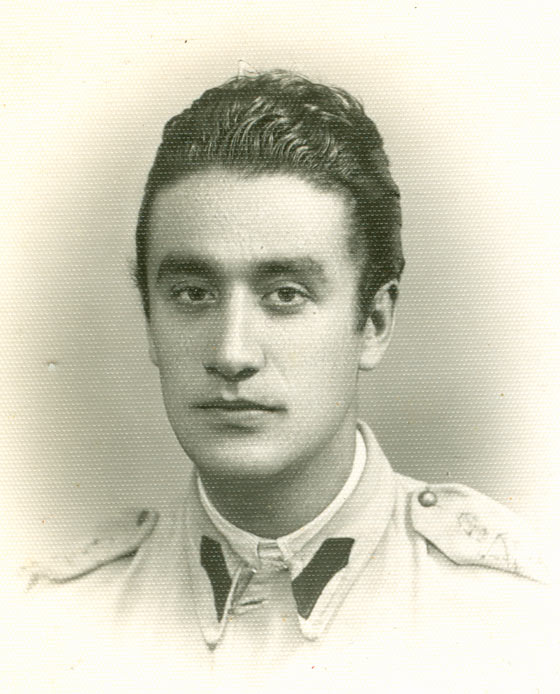 When Sergiu Celibidache was six months old, in 1913, the Celibidache family moves in Iași, a town of which Sergiu will be especially fond of and of which he will miss immensely during his worldwide tours.
When Sergiu Celibidache was six months old, in 1913, the Celibidache family moves in Iași, a town of which Sergiu will be especially fond of and of which he will miss immensely during his worldwide tours.
Like another great personality of the Romanian culture (Lucian Blaga), Celibidache, the child, remained in an absolute silence during his first years of life, not muttering a single word. Alas, when he broke out of his silence, Sergiu, the child, learns even the Yiddish language, fact he owes to the Jewish community living in the town. 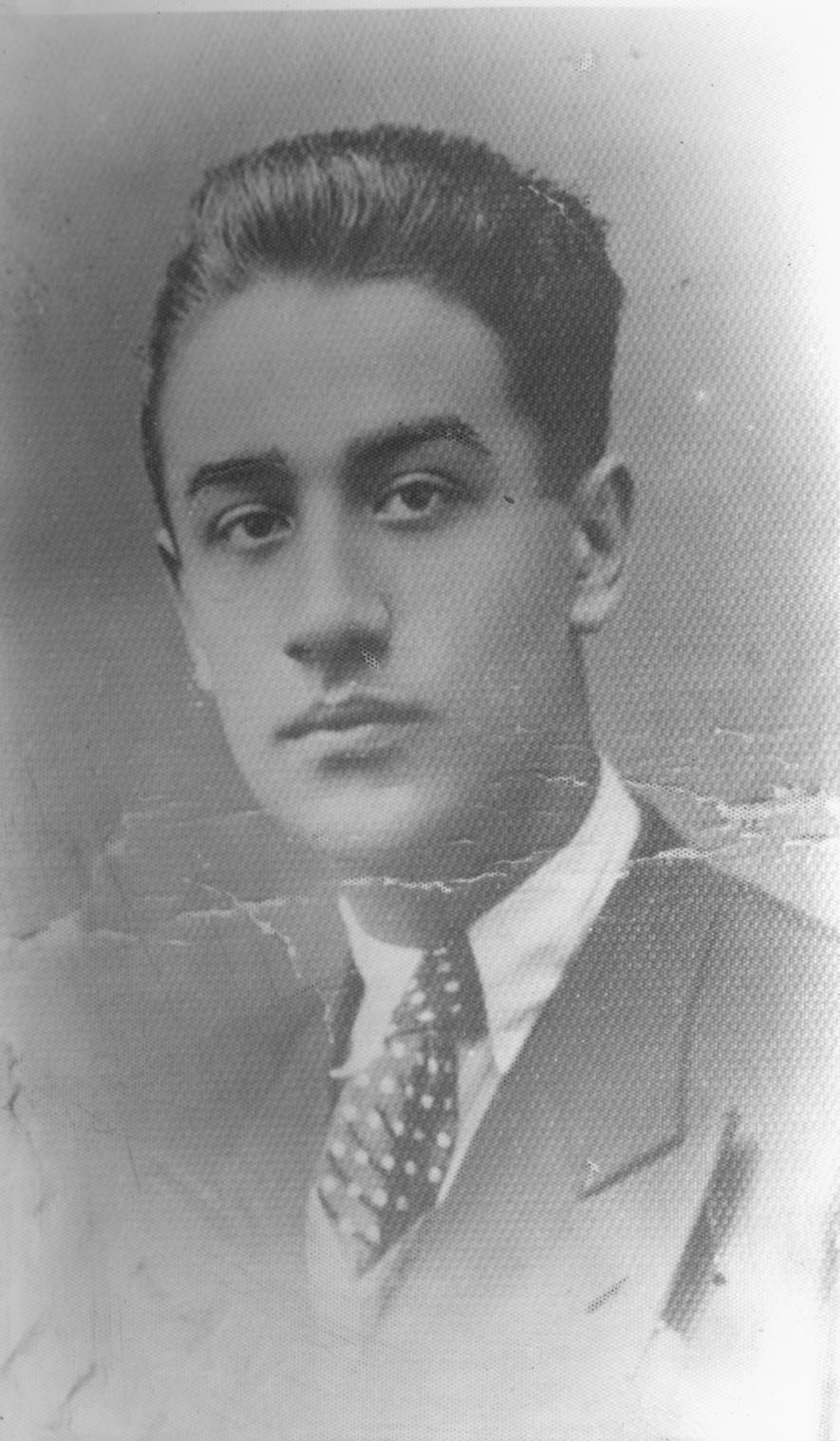
At the age of 4, Sergiu Celibidache starts playing the piano. He proves to be incredibly intelligent, being an exceptional student. Around his coming of age, there is a split between the son and father because of the misunderstandings created by his future career: Demostene, an influential cavalry officer and a prefect of the region, dreamt a political career for his son. Sergiu, on the other hand, listens to the call of music to which he will have a special sensibility his entire life.
Following this disagreement, the young Celibidache leaves his parental home forever. He studies mathematics, philosophy and music in Iași, and, after the split from his family, he continues his studies in Bucharest, earning his living as a co-rehearsal piano player at a dance school.
At the age of 24, he moves to Germany where he succeeds to enter first on list at the Berlin University, where 138 participants fought over 25 places. Among his professors there were Heinz Tiessen (composition), Hugo Distler (counterpoint), Kurt Thomas and Fritz Stein (theory), Eduard Spranger and Nicolai Hartmann (philosophy), Arnold Schering and Georg Schunemann (musicology), Walter Gmeindl (conducting), all people of exception of their epoch.
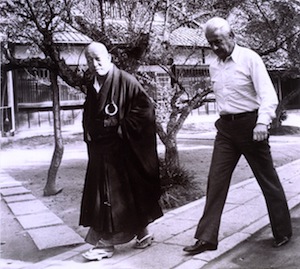 Another stepping stone event for Celibidache in Berlin, in 1939, was the encounter with the Buddhist monk, Martin Steinke (Dao Jun), who introduces him to Zen-Buddhism and to whom he will be connected by a lifelong friendship.
Another stepping stone event for Celibidache in Berlin, in 1939, was the encounter with the Buddhist monk, Martin Steinke (Dao Jun), who introduces him to Zen-Buddhism and to whom he will be connected by a lifelong friendship.
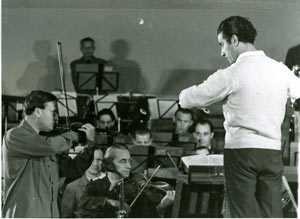 Sergiu Celibidache was compelled from a young age to support himself, and to earn his living in 1940, he works, among others, as a dancer’s co-rehearsal pianist, accompanying him in his tours. However, he continues to dedicate himself to his own works, and also starts conducting, at start, the choirs of the railway workers and of the tram inspectors. At that moment, he considers himself, first of all, a composer.
Sergiu Celibidache was compelled from a young age to support himself, and to earn his living in 1940, he works, among others, as a dancer’s co-rehearsal pianist, accompanying him in his tours. However, he continues to dedicate himself to his own works, and also starts conducting, at start, the choirs of the railway workers and of the tram inspectors. At that moment, he considers himself, first of all, a composer.
Life conditions for Celibidache in the World War II Berlin, although he was always poor, now the situation was tense as he had no money, had lost a lot of weight and handled those times only due to the selfish help of a couple that were tram workers. He was given by them a room where he lived for years (Berlin Halensee, în Eisenzahnstraße 26a).
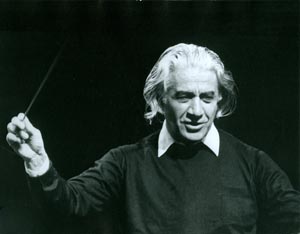 Sergiu Celibidache was considered a student with special abilities in home country, Romania, hence he was never called from Berlin to fight in the war. This detail allowed him to continue his studies in Berlin during World War II. Because the professors were forced to leave, Sergiu Celibidache had to teach his own colleagues various disciplines. During this time, he had to fight for survival, as he lacked food and dodging bombings.
Sergiu Celibidache was considered a student with special abilities in home country, Romania, hence he was never called from Berlin to fight in the war. This detail allowed him to continue his studies in Berlin during World War II. Because the professors were forced to leave, Sergiu Celibidache had to teach his own colleagues various disciplines. During this time, he had to fight for survival, as he lacked food and dodging bombings.
His first commitment as a permanent conductor was in 1941-1942 at the amateur ensemble ,,Orchester Berliner Musikfreunde’’ (,,The Berliner Friends of Music Orchestra”), alongside which he held at least 7 public concerts and to which he dedicated an assay-sample composition. Since the beginning, Celibidache amazes through his extraordinary memory, as he knew all conducted works by heart.
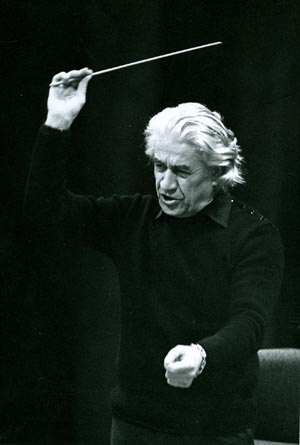 On the 29th of August 1945, Sergiu holds his first concert with the Berlin Philharmonic Orchestra, being the beginning of an intense activity at the helm of this orchestra.
On the 29th of August 1945, Sergiu holds his first concert with the Berlin Philharmonic Orchestra, being the beginning of an intense activity at the helm of this orchestra.
Just one year later, in February 1946, he is chosen chief-conductor of the Philharmonic, until the return of Wilhelm Fürtwangler from his exile in Switzerland.
A fulminatory debut follows in London, in 1948, which will mark the beginning of extended tours, with remarkable echoes abroad. In the same year he signs his first (and only) recording contract with the famous producer, Walter Legge. From that moment on, after he listened to he recordings, Celibidache vehemently opposed them, preferring the direct character of live concerts. He thought that recording prevent „the engagement of the listener into the music and could offer nothing but a deformed representation of reality”. 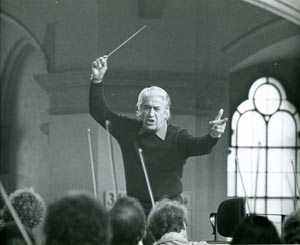 In 1954, on the 29th of November, the last concert with the Berlin Philharmonic takes place, as they chose Herbert von Karajan as successor of Wilhelm Fürtwangler. Sergiu suffers a strong disappointment, but his career is untouched and follows a rising route: worldwide recognition through a wave of international travels that, finally, lead to establishing his home in Italy. Even more, in 1960 he becomes the Artistic Manager of the Royal Orchestra in Copenhagen (until 1963), and in 1963 he becomes the Artistic Manager of Stockholm Swedish Broadcasting Symphonic Orchestra (until 1971).
In 1954, on the 29th of November, the last concert with the Berlin Philharmonic takes place, as they chose Herbert von Karajan as successor of Wilhelm Fürtwangler. Sergiu suffers a strong disappointment, but his career is untouched and follows a rising route: worldwide recognition through a wave of international travels that, finally, lead to establishing his home in Italy. Even more, in 1960 he becomes the Artistic Manager of the Royal Orchestra in Copenhagen (until 1963), and in 1963 he becomes the Artistic Manager of Stockholm Swedish Broadcasting Symphonic Orchestra (until 1971).
In 1968, Sergiu becomes a father, Serge Ioan coming into this world on the 18th of June.







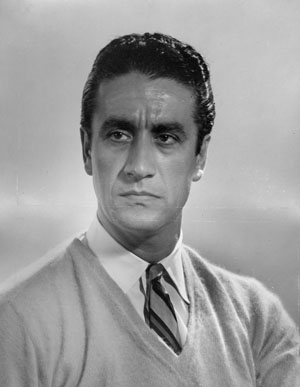 Subsequently, he becomes the Chief-Conductor of the Orchestra and the Musical General Manager of city of Munich. It is the same Philharmonic alongside which he will hold a concert in Romania, after the fall of Communism.
Subsequently, he becomes the Chief-Conductor of the Orchestra and the Musical General Manager of city of Munich. It is the same Philharmonic alongside which he will hold a concert in Romania, after the fall of Communism. 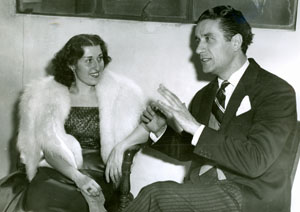 In 1992, he returns to the desk of the Berlin Philharmonic Orchestra. Always tireless, Sergiu has tours in Japan, Germany and South America, having his last tour abroad in 1995, and, the following year, his last conducting concert in Munich.
In 1992, he returns to the desk of the Berlin Philharmonic Orchestra. Always tireless, Sergiu has tours in Japan, Germany and South America, having his last tour abroad in 1995, and, the following year, his last conducting concert in Munich. 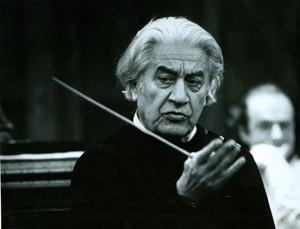 Among other compositions, Sergiu Celibidache is the author of the “Haz de necaz” suite, unraveled to the audience on the 7th of July 2012, as a world premiere, in Bucharest; of an impressive Requiem, four symphonies and of a Concert for piano and orchestra, most works being still novel.
Among other compositions, Sergiu Celibidache is the author of the “Haz de necaz” suite, unraveled to the audience on the 7th of July 2012, as a world premiere, in Bucharest; of an impressive Requiem, four symphonies and of a Concert for piano and orchestra, most works being still novel.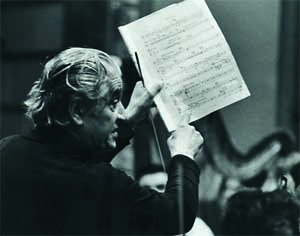 The year 2012 was declared Sergiu Celibidache Global Anniversary year, and with this occasion numerous cultural manifestations were organized, with the first edition of Sergiu Celibidache International Festival, a biennially event taking place in Bucharest being the most important one. A unique conductor, with over 100 concerts a year, Sergiu Celibidache was extremely popular with Romanians.
The year 2012 was declared Sergiu Celibidache Global Anniversary year, and with this occasion numerous cultural manifestations were organized, with the first edition of Sergiu Celibidache International Festival, a biennially event taking place in Bucharest being the most important one. A unique conductor, with over 100 concerts a year, Sergiu Celibidache was extremely popular with Romanians. 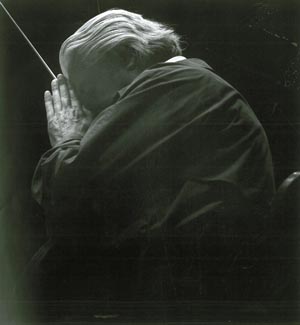 For his artistic activity, Sergiu Celibidache received various distinctions, among which we can find: The Berliner Art for Music Award (1953), The Cross of Merit of the German Federal Republic (1954), The German Critics Union’s Award (1955), Cavalier of the Vasa Order Sweden (1970), The Danish Music Award Leonie-Sonning (1970)The Golden Honorary Coin of the City of Munich (1987), Nettuno d’oro (Golden Neptune) in Bologna (1987), The Honorary Golden Needle of the City of Milano (1987), Emeritus Professor in Berlin (1991), Honorary Citizen of the City of Munich (1992), Honorary Member of the Romanian Academy (1992), The “Maximilian” Great German Art Order (1993), Honorary Citizen and „Doctor Honoris Causa”of the Art Academy in Iasi (1994), Arts and Letters Commander by the French government (1995).
For his artistic activity, Sergiu Celibidache received various distinctions, among which we can find: The Berliner Art for Music Award (1953), The Cross of Merit of the German Federal Republic (1954), The German Critics Union’s Award (1955), Cavalier of the Vasa Order Sweden (1970), The Danish Music Award Leonie-Sonning (1970)The Golden Honorary Coin of the City of Munich (1987), Nettuno d’oro (Golden Neptune) in Bologna (1987), The Honorary Golden Needle of the City of Milano (1987), Emeritus Professor in Berlin (1991), Honorary Citizen of the City of Munich (1992), Honorary Member of the Romanian Academy (1992), The “Maximilian” Great German Art Order (1993), Honorary Citizen and „Doctor Honoris Causa”of the Art Academy in Iasi (1994), Arts and Letters Commander by the French government (1995). 
